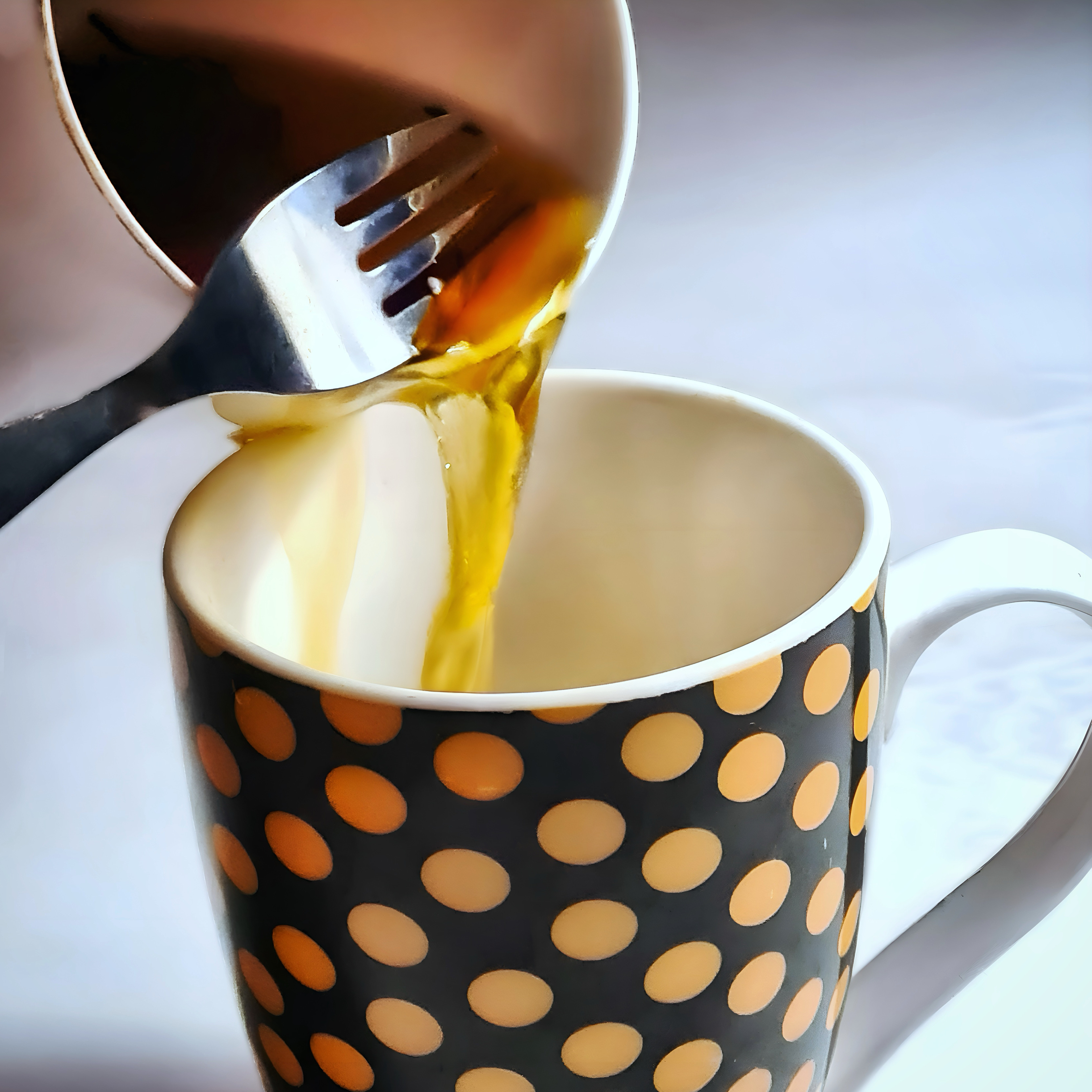Have you ever thought about adding milk to your herbal tea? I would watch your back if I were you, just in case you offend somebody! Adding milk to herbal tea is quite the controversial topic in the tea community, since milk is thought to ruin the taste and texture of many herbal teas. And while this is correct for many, there are actually a variety of herbal teas that work wonders with milk. So if you want to find out the do’s and dont’s of adding milk to herbal tea, join us, where we dive into the world of milk and herbal teas!

What are Herbal Teas?
Before we get into it, I’ll quickly go over what makes a herbal tea for those who are less familiar. Herbal teas are not true ‘teas’, in the sense that they do not come from the Camellia sinensis plant. This is the plant used to produce your typical teas, such as black tea, green tea, white tea, and oolong. Instead, herbal teas are infusions of various plants, flowers, fruits, spices, and herbs that have different tastes and effects on the body. Some of the most common herbal teas are chamomile, peppermint, ginger, lavender, lemon balm, and rooibos.
Much like regular tea, herbal ‘teas’ have been used for centuries for their medicinal and therapeutic properties. Depending on the ingredients, they can have many great benefits like help with digestion, relaxation, immunity, inflammation, and many more. Additionally, many herbal teas can also provide antioxidants, vitamins, minerals, and other beneficial compounds to boost your health and wellness! So, why would you want to add milk?
Why Do People Add Milk to Tea?
I’m sure you all know how delicious and creamy a milk tea is, but did you know, adding milk to tea is a tradition that dates back to the 17th century. This was around the time when tea was first introduced to Europe from Asia. Unsurprisingly, the British were the first to adopt this practice, as they found that adding milk to their black tea made it smoother, richer, and less bitter. They also believed that adding milk to tea would prevent the hot tea from cracking their delicate porcelain cups.
Today, lots of people still enjoy adding milk to their tea, especially black tea, chai, and some flavored teas. For many, milk can enhance the taste and texture of the tea, as well as balance out the acidity and caffeine. Milk can also add a small amount of nutritional value to the tea, such as calcium, protein, and fat.
Adding milk to herbal tea
Unlike your traditional teas, adding milk to herbal tea is not so common or as widely accepted. Herbal teas have very different flavors and properties that sometime will not work well with milk. Plus, some herbal teas may lose their potency or aroma when mixed with milk, while others may create unpleasant combinations or reactions. However, don’t fret, as certain types of herbal tea work particularly well with milk!
The Best Herbal Tea and Milk Combinations:
Now, down to the real business. What types of herbal tea are best suited for milk? Obviously, there is a level of subjectivity, as some people may disagree with these choices. There is no hard or fast rule, so don’t be afraid to try adding milk to any of your teas. However, there is a general consensus on certain teas being suitable for adding milk. So here is a list of the most popular teas that tend to work well with milk:
1. Turmeric Tea

Turmeric is a spice that you might be more familiar with in curries. However, it’s also a common herbal tea ingredient with anti-inflammatory, antioxidant, and anti-microbial properties. Whats great about turmeric tea is its warm and earthy flavor which compliments the taste of milk very well! It also has bitter sweetness to it, so milk actually help balance out the bitterness. Personally, I like adding a splash of honey too!
Not only this, but milk can also help with the absorption of curcumin, the active ingredient in turmeric, as it is fat-soluble. So adding milk to turmeric tea can actually make it even healthier! This is great, since turmeric tea already possesses benefits for athiritus, diabetes, skin health, and more! You could also try a turmeric latte or a Ginger Turmeric Tea with milk for some other variations.
2. Rooibos Tea

Next on the list; rooibos tea, also known as “red bush.” Rooibos is a very unique and popular herbal tea, made from a plant that grows in South Africa. This plant produces a reddish-brown infusion that is caffeine-free and rich in antioxidants.
Rooibos tea has a sweet and nutty flavor that sometimes gives off natural notes of vanilla and caramel. So as you can imagine, milk would be the perfect ingredient to complement these flavors and bring out the creaminess and smoothness of the rooibos tea. And as with many herbal teas, honey is also a great addition to increase the natural sweetness.
One of my favorite red bush blends to combine with milk is Bird & Blend’s Rooibos Gingerbread Chai. It has a scrumptious and warming blend of gingerbread spiced chai with rooibos tea as the base. This is a must-have for herbal tea fanatics who love a milky finish. You can even turn it into a creamy Gingerbread Chai Tea Latte.
3. Chamomile Tea

Chamomile tea is one of my favorite herbal teas for many reasons. It comes from a daisy-like flower that has calming and soothing effects on the body and mind. Typically used to help with insomnia, anxiety, stress, and digestion. Funnily enough, I was always against putting milk into my chamomile teas until very recently. I just sort of assumed that this was one of those forbidden milk and tea combinations, but how wrong was I!
Chamomile tea has a floral and mild flavor which has this honey-like sweetness to it. So when adding a splash of milk to it, you can emphasise that honey-milk flavor. Even better, try adding soy milk and a dash of vanilla or cinnamon for a more warming flavor.
If you want to really push the boat out, I once heard about this delicious recipe that involved steeping the chamomile tea in steamed soy milk, with lavender and honey. I’m still yet to try this mouth-watering recipe, but why not give it a try and let me know how it goes in the comments below!
4. Masala Chai

The mighty masala chai is a spiced tea that originated in India and consists of black tea, milk, sugar, and a blend of spices, such as cardamom, cinnamon, ginger, cloves, and black pepper. Typically, the masala chai will have black tea in it, which is not a herbal tea. However, I added this to the list since you can also enjoy chai without black tea, much like the rooibos chai I mentioned before.
Masala chai includes a cocktail of spices, giving it that infamous spicy and aromatic flavor to warm you up and stimulate your senses. Whilst you can enjoy chai without milk, it might blow your head off with its spicy kick. So milk is actually an essential ingredient in masala chai, as it balances out the spiciness and bitterness of the tea and spices.
5. Rose Tea

Rose tea is slightly less common than the other herbal teas on this list, but not to be disregarded! Rose tea is a herbal tea made from the petals or buds of roses, or sometimes from rose-flavored herbs, such as rosehip or rosemary. It has a distinctive floral and sweet flavor that can help with stress, mood, and skin health.
In South Asia, where I currently live, rose is used a lot in many different drinks and dishes. One drink in particular that everyone loves is called a ‘falooda’, including rose syrup, milk, jelly, and vanilla ice cream. It’s a beautiful looking drink with a delicious creamy sweetness. So when it comes to adding milk to rose tea, you actually get somewhat of a similar taste.
Not only is it creamy and smooth, but it also balances out the acidity and fragrance of the rose. It can also be enhanced by adding some honey or sugar for extra sweetness, and some vanilla for a taste of falooda!
What are the Benefits of Adding Milk to Herbal Tea?
Now you know that adding milk to herbal tea can improve the flavor in some cases, but what are all of the benefits you get from adding milk? There are actually a few more good reasons to add milk, depending on the type of tea and milk you use. So if you are not adding milk to your herbal tea already, here’s some more reasons why it can help:
- Taste enhancement: As mentioned before, milk can improve the taste of some herbal teas by adding some sweetness, creaminess, and richness. Milk can also mellow out some strong or bitter flavors of some herbal teas, making them more palatable and enjoyable.
- Texture improvement: Another benefit of adding milk is to improve the texture of some herbal teas. Adding milk to your herbal tea can sometimes help by adding some body, smoothness, and frothiness. Milk can also prevent some herbal teas from becoming too watery or thin, making them more satisfying and filling.
- Nutritional value: Milk can add some nutritional value to some herbal teas by providing some calcium, protein, and fat. As we touched on earlier, milk can also help with the absorption of some fat-soluble compounds in some herbal teas, such as curcumin in turmeric tea.
- Variety and creativity: Lastly, milk can add some variety and creativity to some herbal teas. Experimenting with different types of milk, such as cow’s milk, almond milk, soy milk, oat milk, etc, can allow you to create different flavors and combinations with some herbal teas. For example, vanilla rooibos, caramel chamomile, or chocolate chai.
The Worst Herbal Tea and Milk Combinations?
You may now have a new-found love for adding milk to herbal tea, however, don’t get too carried away! While some herbal teas can benefit from adding milk, there are many others that are better enjoyed without it. In fact, some can even cause your milk to curdle. So pay close attention, and check out some of the worst herbal teas to combine with milk:
1. Lemon Tea

Lemon tea is a type of herbal tea that is made from the peel, juice, or slices of lemon, or from lemon-flavored herbs, such as lemon verbena, lemongrass, or lemon balm. As you would expect, lemon tea has a citrusy and tangy flavor that can help with digestion, detoxification, and immunity.
However, lemon tea is best enjoyed without milk, as milk can curdle or spoil when mixed with lemon, creating an unpleasant taste and texture. The milk can also interfere with the acidity and vitamin C content of lemon tea, reducing its health benefits and effectiveness. If you really want to try it, you can use non-dairy milk instead to prevent curdling.
2. Licorice Tea

Another terrible choice would be licorice tea. It is another type of herbal tea, but made from the root or extract of the licorice plant which has a sweet and licorice-like flavor. Licorice tea can help with sore throat, ulcers, skin conditions, and menstrual cramps.
You guessed it, licorice tea is best enjoyed without milk, as milk can actually interfere with the absorption and effectiveness of licorice. Licorice is a potent herb that can affect blood pressure, potassium levels, and hormone balance. So it’s best to avoid this combination. Not only this, but milk can also dilute the sweetness and flavor of licorice tea, making it less satisfying and beneficial
3. Mint Tea

Mint tea; a herbal tea made from the leaves of various mint plants, such as peppermint, spearmint, or apple mint. You would instantly recognise mint tea from its refreshing and cooling flavor. Often helping with things like bad breath, digestion, and headaches.
Mint tea is best enjoyed without milk, as milk can reduce the freshness and crispness of mint, making it less invigorating and soothing. Unlike the previous teas, there are not any major drawbacks to adding milk to mint tea. Some (strange) people even like it with milk! Although, generally considered an un-appetising combination. Let us know in the comments if you disagree!
4. Fruit Teas

Fruit teas (sometimes called ’tisanes’) are a type of herbal tea made from the dried or fresh fruits, or from fruit-flavored herbs, such as hibiscus, rosehip, or lemon verbena. These types of tea have a fruity and tangy flavor that can help with hydration, vitamin C intake, and antioxidants.
Whilst fruit teas are very delicious and refreshing, they are best enjoyed without milk. Much like the lemon tea mentioned before (which is technically a fruit tea too), milk can curdle or spoil when mixed with fruit, creating an unpleasant taste and texture. Milk can also interfere with the acidity and flavor of the fruit tea, reducing its freshness and vibrancy. Some particularly bad examples of fruit teas that do not mix with milk are pineapple tea, orange tea, blueberry tea, and passion fruit tea.
If you really have a craving to try fruit tea with milk, you can try various things to prevent the milk curdling. For example, pouring the milk slowly bit-by-bit whilst stirring, or adding a small amount of salt to your tea. Click the link to find out more about preventing curdling in your tea.
What are the Considerations and Tips When Adding Milk to Herbal Tea?
As we demonstrated earlier, some herbal teas benefit from milky goodness, and some just taste a bit odd when combined with milk. Since adding milk to herbal tea is not always a good idea, there are a few things you should consider and be careful of when doing so. Here are some important considerations and tips when adding milk to herbal tea:
1. Type of Tea
To begin with, the obvious one. Not all herbal teas are compatible with milk, and some of them may lose their flavor, aroma, or potency when mixed with milk. For example, peppermint tea, lemon balm tea, or ginger tea may not taste good with milk, as they have citrusy or spicy flavors that may clash with the milk. Some herbal teas may also have adverse effects when combined with milk, such as licorice tea, which may increase blood pressure, or hibiscus tea, which may curdle the milk.
2. Type of Milk
Not all types of milk are suitable for adding to herbal tea, and some of them may alter the taste, texture, or color of the tea. For example, cow’s milk, which is the most common type of milk, may overpower some delicate or subtle flavors of some herbal teas like lavender tea.
Whereas, some plant-based milks, such as almond milk or soy milk, may have distinct flavors or aromas that may not match well with some herbal teas. In particular, I would avoid these milks with turmeric tea or rooibos tea. Addtionally, some milks may also have different levels of fat, sugar, or additives that may affect the quality or healthiness of the tea.
3. Amount of Milk
The amount of milk you add to your herbal tea can make a big difference in the outcome of the tea. Too much milk can dilute the tea and make it too milky or bland, while too little milk can make the tea too strong or bitter. The ideal amount of milk depends on your personal preference and the type of tea you are using, but a general rule of thumb is to use about a quarter of milk (or just a splash) for every cup of tea. Although, this may just be my Britishness…
4. Temperature and Timing
The temperature and timing when it comes to adding milk to your herbal tea can also affect the result of the tea. If your milk is too or too cold, it can change the temperature of the tea and affect its flavor and aroma. Too early or too late, and it can affect the steeping and brewing of the tea and affect its strength and quality.
The best temperature and timing of adding milk to your herbal tea depends on the type of tea and milk you are using, but a general rule of thumb is to heat the milk to about the same temperature as the tea, and add it after the tea has steeped for the recommended time.
Conclusion
As you can see, adding milk to herbal tea is not a simple or straightforward question, as it depends on various factors, such as the type of tea, the type of milk, the amount of milk, and the temperature and timing of adding milk. Whilst some herbal teas benefit from adding milk, others not so much.
Although, it’s worth pointing that sometimes it comes down to subjectivity. Some teas you should absolutely avoid, whereas, some might work well with your taste buds (despite being frowned upon elsewhere!). The best way to find out is to experiment with different combinations and see what works for you. You may even discover new flavors and sensations that you never knew before.
So, can you add milk to herbal tea? The answer is: Yes… Well, sort of… I guess it depends. But why not give it a try? You might be pleasantly surprised!
Discover More Tea-Related Articles:
- How to Make Black Soybean Tea – Japanese Kuromamecha
- What to Do With Old Tea Leaves And Tea Bags – 9 Useful Ways
- How to Make Walnut Tea – The Traditional Tea of Gilgit Baltistan
- Blood Orange Iced Tea: A Simple Recipe For The Sweet Tooth
- How to Make Beetroot Tea: A Healthy Vegetable Brew
Sources:
- Why Is My Milk Curdling In My Tea? Find Out The Surprising Reason – Cookindocs.com
- LICORICE: Overview, Uses, Side Effects, Precautions, Interactions, Dosing and Reviews (webmd.com)
- Milk, lemon or sugar? When to sweeten and when not to. – Fairmont Store US
- Does Turmeric In Milk Get Absorbed In Body? Myths Related To Turmeric (abplive.com)
- Masala Chai (Tea) Recipe – Spiced Chai – Tea for Turmeric
- Milk in your daily cup of tea? (theuklooseleafteacompany.co.uk)





Leave a Comment